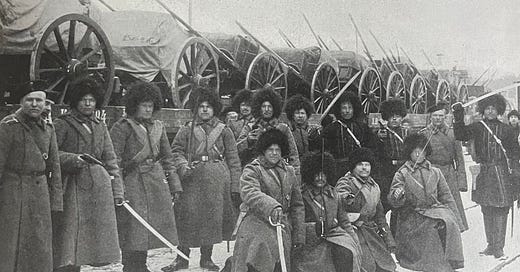A couple of weeks ago one of my favourite people put a present in my hands. A3 in size, it was an album of photographs printed in New York in 1905 which covered the Russo-Japanese War. I thought I’d use some of the images today to highlight why the concept of the First World War heralding in a completely new style of warfare that nobody saw coming is wrong. The similarities are so apparent, on the battlefield and beyond, that some historians refer to this conflict as World War Zero…
The image above shows the Russia fleet sailing out of the inner harbour at Port Arthur in Manchuria; and is very much a modern scene that then went through to the First World War. This large-scale naval battle marked the beginning of the war in 1904. Much like the Battle of Jutland in 1916, it ended inconclusively. It’s interesting though, when you know what we do about the German navy refusing to come out to fight elsewhere in the First World War, that the Japanese Admiral did the same here. He held back his main strength, not wanting to risk it. Boats were expensive and shiny.
The big one is artillery. The above image shows a Russian unit leaving for the war. How did generals not know that the First World War would become bogged down in a static battle dominated by artillery? Well, they kind of did. The evidence of industrialised firepower and the destruction it caused was there for everybody to see as far back as the American Civil War, but really, nobody had any excuse if they had watched this conflict play out in Asia. And watch they did, because nearly three dozen military observers travelled east to study what was going on, live. To counter that, though, using Britain as an example, by 1914 the British Army had more shells on hand than were fired in the entirety of the Boer War. They had seen the trend, they had acted on it, but just not nearly enough for the scale of what was to come.
Keep reading with a 7-day free trial
Subscribe to Alex Churchill’s HistoryStack to keep reading this post and get 7 days of free access to the full post archives.





